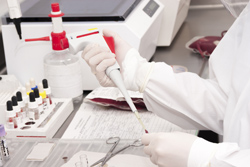An HIV portable diagnostics tool
HIV poses one of the major medical challenges in the history of humanity, with millions of individuals becoming infected each year. Diagnosis takes place in laboratory conditions and is often lengthy and laborious. Current assays lack sensitivity and can give false negative results, especially at early time points of infection when viral load is low. A false negative result prohibits prompt treatment with high anti-retroviral therapy (HAART) at the most acute phase of the infection, which occurs during the first few weeks after exposure. As a result, more accurate and rapid assays are urgently required at low cost so that they could be applied in developing countries with a high incidence of HIV infection. The EU-funded 'Early detection of HIV-1 using ultra-sensitive, rapid capacitive biosensor' (CAPHIV)(opens in new window) project worked on a system able to detect the viral capsid protein p24 even present at low concentrations in human blood. The technology behind the CAPHIV system does not require amplification of the signal and the result is delivered within half an hour. As a first step, partners had to adapt the technology to a portable configuration and also optimise the sensor to eliminate non-specific binding. The surface chemistry was also manipulated to accommodate diluted blood samples without the need for further preparation. A fully closed vacuum tube technique screens the patient blood directly. The researchers have built four prototypes that will be tested in the upcoming CAPHIV-DEMO project. Given the millions of people living with HIV worldwide, the global market for HIV testing is worth billions of euros and targets mainly African and South-American countries where point-of-care HIV testing is urgently needed. At a low cost per test – estimated at 10 euros – the CAPHIV system offers a safe, portable and inexpensive means of HIV diagnosis. The device could also find application in the screening of first time blood donors by blood banks or could be adapted in the future for screening of other infectious diseases.







